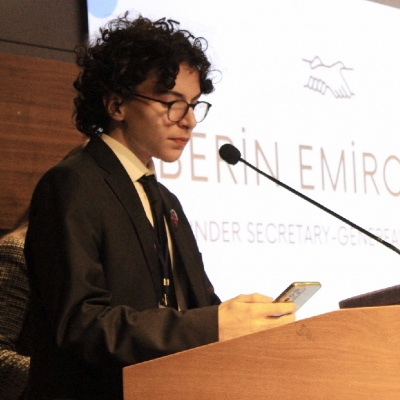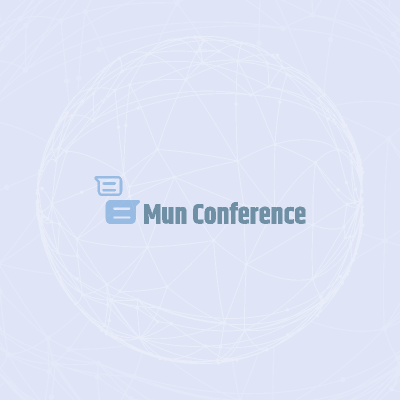
YCMUN'25
Yüce College Model United Nations 2025
Konferans Ücretleri
Organizatörler




Komiteler

Agenda item: Gun Violence
USG: Alin Kayalı
On the committee, senators will represent the United States Senate, one of the two houses of the US Congress and responsible for creating national laws. Therefore, each delegate will play the part of a US senator representing their state and political views. Senators will often be involved in a debate, amendment, and enactment of bills. During this simulation, senators will address the issue of gun violence in the US, giving their opinions, and collaborate to develop practical legislative solutions.

Agenda item: Addressing the impact of climate change on developing nations
USG : Ekin Toprak
ACAS : Kerem Aktaş, Arda Şen
The UNEP committee is the UN’s leading body when it comes to environmental issues, achieving environmental sustainability, establishing international guidelines regarding the ecosystem and ensuring future generations have a clean and sufficient planet to call their home. UNEP recognizes that issues which are a result of climate change, such as rising temperatures, droughts, flooding, and several more, impact the poverty reduction, food security and economic stability of developing countries the most. Although most developing countries contribute very little to global emissions and climate change, they are often the ones which do not have the financial and technological capabilities to make up for the damage caused by the global issue. Therefore, this agenda item and committee will focus on establishing equitable and accessible climate action as well as ensuring that developing nations receive the needed support to combat climate change, protect their citizens, and take their first step into a sustainable future.

Agenda item: Addressing illicit trafficking and protection of cultural property
USG : Umay Tamer
ACAS : Nilda Yiğit
The United Nations Educational, Scientific, and Cultural Organization (UNESCO), is a specialized organization under the UN; promoting world peace and global security by universal unity in arts, science, education, and culture. As the successor of the League of Nations’ International Committee on Intellectual Cooperation, the committee’s aim to support peace, sustainable development, and human rights have been significantly shaped to its current form by the movement of World War II. UNESCO actively operates in order to strengthen the capacities of its Member States for combating the illicit trafficking of cultural property, preserving underwater cultural heritage, and promoting the significance of museums.
The committee's agenda, addressing illicit trafficking and protection of cultural property, is to discuss and find solutions upon the protection of the most unique and invaluable heritage a community can have. UNESCO deeply appreciates the effect a part of culture may have by celebrating historic monuments, museums, contemporary art and living heritage projects; while enriching lives, by constructing inclusive, inventive, and resilient communities. The main goal of this committee is to maintain the identity of nations, acknowledging the importance of recalling the past.

Agenda Item : Strengthening protections around women's fundamental rights in the MENA region
USG : İnci Yiğit, Ali Mete Çavdar
The United Nations Entity for Gender Equality and the Empowerment of Women (UNWOMEN) deals in majority with issues regarding the protection of and advocation for women's and girl's rights on a global scale. This commitee will be focusing primarily on achieving this in the Middle East and North Africa Region, an area where it is especially crucial that UNWOMEN achieve its purpose. Per the Universal Declaration of Human Rights, every human - and thus woman has the right forefrontly to life, and further a right to a life of their own choosing, and a life they can live fully. In a time where this has become increasingly difficult to see, the delegates are tasked with creating a better, more inclusive, and more livable future for millions of women.

Agenda Item : 1990 London NATO Summit
USG : Kemal Tuğra Akçan
ACAS : Neva Özkül
The North Atlantic Treaty Organization is made up of 32, 30 European, and 2 North American countries. The organization was created following World War II to carry out the North Atlantic Treaty, which was signed on April 4, 1949, in Washington, D.C. NATO is a system of collective security in which the independent member states agree to defend one another from outside an assault. During the Cold War, NATO acted as a deterrent to the Soviet Union's threat. The alliance continued after the fall of the Soviet Union and the Warsaw Pact, participating in military actions in South Asia, Africa, the Middle East, and the Balkans. The organization's motto is “animus in consulendo liber” (Latin for "a mind unfettered in deliberation").
Within this committee, the ambassadors will represent 16 countries, as the committee is a historical committee. With the Berlin Wall having just fallen, NATO must make arrangements for East-West relations and transition from its "military organization" identity to a "peace, stability and cooperation organization." The delegates will lay the foundations of a new European security architecture, direct their policies to address the threat of the vanishing Soviet Union, and aim to establish NATO's transformation on solid foundations.

Agenda item: Battle of the Somme
USG : Yağız Eren Şahin, Ali Batuhan Taçbaş
ACAS : Eymen Eker Göçer
Europe, to the date of July 1916, had never seen a battle so bloody before. Somme stands alone as -by far- the deadliest battle of the Great War, despite lasting no longer than 5 months. Somme saw immense casualties on its first day alone, where the British saw a count close to 60,000, 20,000 of which being confirmed deaths.
The main reason the Entente saw this battle fit was to relieve the pressure on the battling French at Verdun. But many factors had the foresought success hindered and both sides soon were at an impasse. History remembers the Somme as a turning point, a grim testament to the failure of traditional tactics in the face of modern warfare, dominated by machine guns, artillery, and barbed wire. Although the Entente saw about 7 miles of advance and the German forces were severely weakened, there is no doubt this battle was a success of none. Neither could manage to pull through a decisive success, the commanders praised on the fields were covered not in medals bearing honor and glory but the weight of the dead hundred-thousands, their misery, blood and sorrow. But still, you can be the one to overrun the lines of ten thousands that seem like a wall of concentrated human flesh to give the dead thousands their peace. To bring this absolute bloodshed to a conclusion. To give mourning mothers of those martyrs a pale victory they can at least celebrate.

Agenda Item: Impresa di Fiume
USG : Civan Erdoğan
After the Great War, the multiethnic Austro-Hungarian Empire disintegrated, and Fiume, a port city on the Adriatic coast, was claimed by both Italians and Yugoslavs. As peace negotiations progressed, it became clear that Fiume would be left to Yugoslavia, and combined with other losses of territories promised by the Allies, resentment began to build up in the Italian population, best reflected by the term vittoria mutilata, or mutilated victory, coined by the nationalist poet and former colonel Gabriele D’Annunzio. In this environment of irredentist fervor, D’Annunzio, angered by the surrender of an Italian city, marched towards Fiume with around 2,500 veterans. After entering the city on September 12th, 1919, D’Annunzio, unilaterally, declared its annexation. This shocked the globe, and made Fiume the center of one of the most interesting political experiments of the century. In this committee, delegates will simulate the Italian National Council of Fiume, and their goal will be to ensure Fiume’s annexation to Italy. They will have to pursue foreign relations with other nations, and will try to balance the passionate irredentism of D’Annunzio and his legionaries, with the pragmatic solutions the world will inevitably impose upon them.

Agenda Item : Addressing the Threat of Cybercrime: Strengthening Global Cybersecurity Frameworks and Managing the Intersection of Military Operations in Cyberspace
USG : Toprak Buluttekin
ACAS : Gülse Öz
INTERPOL (International Criminal Police Organization) is the world’s largest international police organization, uniting law enforcement agencies from 195 countries to combat crimes that cross borders. It supports global efforts against cybercrime, terrorism, human trafficking, drug smuggling, and organized crime by facilitating information sharing, coordination, and intelligence exchange. Although INTERPOL doesn’t make arrests itself, it strengthens international cooperation through systems like its famous Red Notices, working to ensure justice and security beyond borders.
Sosyal Medya
Konum
En etkili MUN yönetim sistemine ve sosyal MUN Ağı'na katılın. MUNPoint.com’da MUN konferansınızı oluşturabilir, başvuruları sistem üzerinden alıp delegelerinizi çevrimiçi olarak atayabilir, ödemeleri yönetebilir, katılımcılara bildirimler, e-postalar ve doğrudan mesajlar gönderebilir, çevrimiçi sertifikalar ve ödüller oluşturup gönderebilir, katılımcılarınıza MUN CV’lerini oluşturma şansı tanıyabilir, Belge Merkezi'nde belgeler yayınlayabilir ve çok daha fazlasını yapabilirsiniz.






